Tagged: reviews
Saw the funniest, saddest play the other day
- by Alyson Shane

"Happy Place" is playing at the Prairie Theatre Exchange right now and John and I checked it out on opening night last week. I try not to do any research into the shows before we see them so I don't go in with any expectations, and to date it hasn't done me wrong.
"Happy Place" is a play about a group of women who, for one reason of another, all find themselves in an in-patient centre as a result of various types of trauma.
Based on that description you'd probably expect to cry more than you'd laugh, but I don't know if that's quite the case with this play.
The play begins by introducing Samira, a young woman who starts out being withdrawn and quiet around the other patients, and around their doctor, Louise. Over the course of the play we learn that Samira has been sexually abused, at one point through a gut-wrenching monologue that was, honestly, hard to hear.
Other characters include Mildred, the shit-disturber who provides a lot of the comedic relief through her sassy, no-bullshit personality; Rosemary, who is reserved and somewhat condescending; Kathleen, who has also been sexually abused; Nina, who is tightly-wound and whose psyche feels frayed; and Joyce, who spends most of her time being a nosy busybody who one-ups everyone so thoughtlessly that it almost seems like she does so without thinking.
The set was simple: a raised platform with areas off to the side representing the "rooms" the women stayed in. At first it almost felt too simple, but as the play progressed the use of lighting created a surprisingly dynamic and engaging stage setup.
I feel like "Happy Place" is important for several reasons.
The play explores the various ways women can be abused, manipulated, overpowered, and the deep underlying sense of shame and low self-worth that these experiences breed inside of us.
The short scenes and choppy, fragmented way in which the story was told reminded me a lot of what it was like in therapy: short outbursts of extreme emotion that often left you feeling more empty than whole and fulfilled.
There were several group scenes which stood out, including one where Louise asks the women to create a collage of their "happy place" which - I won't go into too much detail here - but this also hit home in a surprisingly profound way as the characters discussed their reactions to the concept of a "happy place".
I cried so hard while watching "Happy Place" that I started to worry about my mascara and eyeliner giving me raccoon eyes.
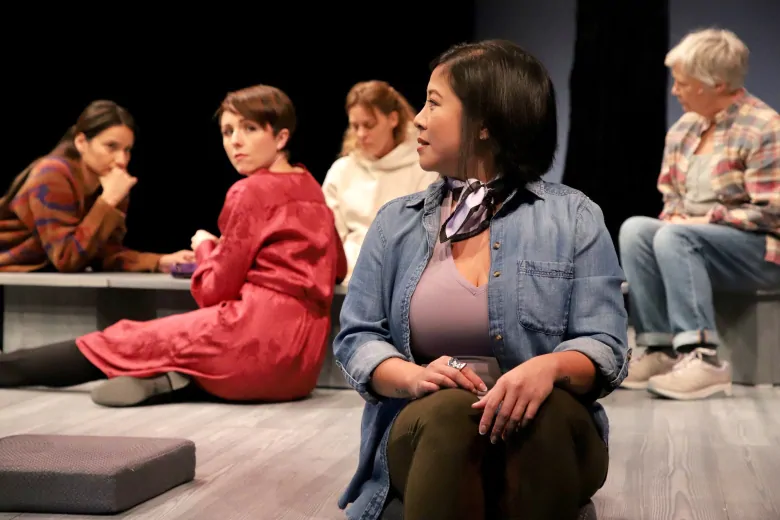
As each of the characters began to process her own trauma, and the role she played in creating or enabling the issue I, and other people in the audience, started to break down.
At one point Joyce, whose constant need to one-up everyone around her had reminded me so much of my mom and my Nan (my mom's mother, ironically also named Joyce) floored me by saying
"I'm not depressed because my husband left me... my husband left me because I'm depressed."
It's not often that a character in a play puts words to your deepest, darkest fear.
I don't think I was quite ready for it. I started crying and had to work to restrain myself from flat-out ugly-crying in the middle of the theatre. I held onto John's hand so tight and saw that he was crying, too.
Most everyone in the theatre was full-on crying by that point, I think.
Which speaks volumes about the play, and its playwright Pamela Mala Sinha. Being able to peel back layers of fear and self-judgment for the things we are ashamed of, or wish we could undo, or forget onstage is a magnificent (if not somewhat off-putting for how personal it felt) feat, and a deeply powerful and moving experience to watch acted out onstage.
"Happy Place" is playing at the PTE until November 25, 2018, and even though I've spent most of this post talking about how sad it was, and how much I cried... that's precisely why you should grab a ticket (or two, it's good to cry with a friend) while it's still playing.
It's not every day that a play touches you as deeply as this one touched me, and based on the sniffling and tissues going around the venue, I doubt I was the only one who felt that way.
**Big thanks to the folks at the Prairie Theatre Exchange for giving me free tickets to see their 2018/2019 season in exchange for these posts. It's a wonderful treat to be able to support and promote Winnipeg's independent theatres.**
In My Community: Gracie at the Prairie Theatre Exchange
- by Alyson Shane
I have a confession: I'm a little obsessed with The Church of Jesus Christ of Latter-Day Saints and its polygamous culture. Weird, I know, but bear with me.
I grew up in a largely unreligious household; I somewhat recall my mom mentioning Sunday School to me when I was a kid, but her big selling point was hot dog days and camping trips, not a deep, personal connection with some higher power. In fact, the closest I remember getting to any sort of organized religion growing up was seeing The Church of Jesus Christ of Latter-Day Saints (LDS) commercials on the American cable networks.
Partially as a result, I now identify as an Atheist, but that hasn't stopped me from developing a weird obsession with religion, especially the more "fringe" versions of beliefs like Christianity like the Mormon LDS faith. It started with Mitt Romney, the 2012 Republican Presidential nominee who apparently wore magic underwear, and became exacerbated when I started watching the HBO show Big Love, a fictional narrative about an LDS polygamist and his three wives.
I'm fascinated by sub-cultures, so it probably comes as no surprise that I was thrilled to discover that Gracie, the first play in the Prairie Theatre Exchange's new season, is all about Mormons and polygamous relationships.

The Play
At it's core, 'Gracie' is a play about self-discovery, rejection, and acceptance. Written by playwright Joan MacLeod, it follows a young girl from the LDS church as her family moves from America to Canada to live on a polygamous compound in British Columbia.
When we first meet Gracie (played by the incredible Samantha Hill) she's eight years old, sitting in a van with her mother and siblings on her way to their new life in Canada. Her mother is getting married, and when they arrive in their new community they're greeted by a group of individuals: boys on bikes, teenage girls carrying their babies, and her mother's new husband, to whom she will be the 18th wife.
(Please excuse me while I shudder for a moment)
During this introduction Gracie meets a young girl named Allie, and they become fast friends, and throughout the course of the play Gracie grows up right before our eyes. By the second act, which takes place four years later, Gracie and Allie are practicing for the exaltation. At school, Gracie bemoans the fact that she has to learn arithmetic in addition to other subjects like English, "science" and "social studies" where half the class studies Jesus Christ and the other studies Joseph Smith, the founder of the Mormon faith.
During this time Gracie's brother gets a job, and her sisters are both married off and begin having children with their assigned husbands. At this point, during the final segment of the play, Gracie is about to turn 16 - marrying age in her community.
During this time Gracie struggles with her changing feelings about her beliefs, culture, and circumstances, and this one-woman play quickly transforms from charming-yet-unnerving overview of a religious subculture to a moving and powerful story about the complex private lives of LDS women which we rarely see beyond TV shows or court testimonials.
Exploring Perspectives
One of the things that struck me about 'Gracie' was how MacLeod used to play to explore uncomfortable subjects like polygamy, religion, and alternative lifestyles and beliefs in a way which felt nonjudgemental; in fact, the play often felt more like a serving of reality than a heavily-researched theatre production.
As a non-religious person I find it's often all-too-easy to dismiss the complex, three-dimensional experiences of women raised in the LDS church. It's easy to say: if it's so bad, why not leave? but plays like Gracie do a tremendous job of reminding us that everyone is an individual with complex, nuanced views and experiences.
One moment which struck me was when Gracie refers to the 'grannies', groups of older women who protest outside the LDS compound with picket signs, outraged at what they perceive to the atrocities being committed within the community:
"They don't like the way we live even though they know nothing about us," Gracie says.
Complicated Positions
As a non-religious person, I often struggle to understand the appeal and value of religious beliefs, and I appreciated watching a performance which didn't pander to my preconceived notions about the LDS church and polygamy in general.
In fact, the play was so well-written that Gracie's experiences, interpretations, and reactions to the events happening to her family and within her community felt more like reading a young girl's diary than a fictional exploration of an unusual religious subculture.
Though I often felt gut-based reactions to certain experiences (such as her mother being someone's 18th wife, and all of the ways it aggravates and upsets my 3rd wave feminist views of the world), MacLeod does a tremendously good job of exploring Gracie's world in ways which feel authentic and realistic, without the bombast which often accompanies literary works which explore religious subcultures.
Evoking Empathy
If anything Gracie acts as a terrific opportunity to explore a secretive, unusual religious subculture without feeling like a voyeur. While the play presents a myriad of uncomfortable and unusual situations that the modern girl (religious or not) doesn't experience, it does so without judgment; it really does feel like a honest, authentic exploration of one girl's perspective on a community which initially makes sense, but which ultimately she (and we) fail to understand and accept.
Gracie runs at the Prairie Theatre Exchange until October 29th, and I highly recommend catching it before it's gone. Not only is it a tremendously good play, but it's a fascinating and highly entertaining exploration of a lesser-known religious subculture.
Elle at the PTE
- by Alyson Shane
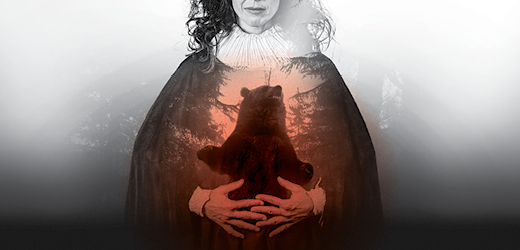
There are few things as powerful as a strong one-person performance, and while Severn Thompson's performance in Elle wasn't completely solo, the 90 minutes that she spent on the stage, almost entirely on her own, were appropriately gripping and moving.
Exploring French-Canadian History
Elle is a theatre adaptation of the Douglas Glover’s 2003 novel of the same name which is currently playing at the Prairie Theatre Exchange. The story focuses on the tale of harrowing survival in pre-colonial Canada, and weaves in themes of feminism, magic, and terror into a gripping performance that demands to be seen.
The play, and the novel upon which the play is based, are an interpretation and expansion of the incredible story of Marguerite de La Rocque de Roberval, played by Severn Thompson, a French noblewoman who travelled to Canada and was marooned on the Isle of Demons, a phantom island, an island off the coast of Newfoundland. She was marooned by the captain of the ship, her relative, who dumped her overboard as punishment for taking a lover during the voyage.
Marguerite is joined by her lover Richard, her maid Damienne, and a boat full of broken tools. Discovering that she is pregnant, she struggles through a series of hardships as her pregnancy progresses: Richard becomes ill and dies; Damienne, too, eventually succumbs to starvation and sickness, and, pregnant and alone, Marguerite's spirit begins to break.
A character who began as a confident and aloof young woman is suddenly left to face the harsh Canadian winters alone, and Thomson's portrayal of a woman whose spirit is breaking in front of you is chilling take on dark humour, to say the very least. As she climbs inside the skin of a bear, worn-out, cold, and ready to give up, she is discovered.
Itslk, played by Johnathan Fisher, is an Indigenous hunter who believes that Marguerite is a spirit, having watched her emerge from inside the bear. He teaches her how to hunt and cook meat, and the real and spirit world begin to blend as Marguerite becomes more in touch with her newfound home.
Intimate and Gripping
Being the sole (or largely solo) actor on stage can be daunting, and often falls flat, but Thompson's depiction of a woman going through a traumatic experience and surviving managed to be both alarming and darkly funny. At times, when Thompson is describing their dire state on the island, living off of “books, bird bones and tennis balls” you almost feel bad for laughing as she trounces around the stage.
The most striking part of the performance, however, was how the stage was integrated with the story. The entire play takes place in front of a large structure which resembles a rib cage (an homage to the bear Marguerite finds, perhaps?) and is the perfect play to see at the Prairie Theatre Exchange because of the smaller stage size and the intimate setting.
By using a long sheet and wrapping it in various ways around the structure the stage is transformed from a ship, to a tiny tent, to the belly of a bear, and more. At one point, while Thompson wound herself up inside the sheet, crying out, it could almost be believed that she was truly losing her sanity.
Elle is a play worth seeing, and a reminder of the hardships that faced both colonists and Indigenous peoples alike all those centuries ago.
In My Community: Mom's the Word at the Prairie Theatre Exchange
- by Alyson Shane
I'm not going to lie to you: I had some reservations about seeing this play (for those of you that don't know, I've been no-contact (NC) with my parents since February of 2015.)
As a result, the idea of seeing a play about motherhood - something that I have yet to experience, and have thus far only really had negative experiences with - gave me some anxiety. I wasn't sure if I wanted to see the play because I worried that listening to stories of motherhood - of love, of unconditional caring and support - would hurt too much.
However, I also realized that it would be a good opportunity to face a fear (and support the Prairie Theatre Exchange*, which I'm always happy to do), so off we went to check out Mom's the Word.
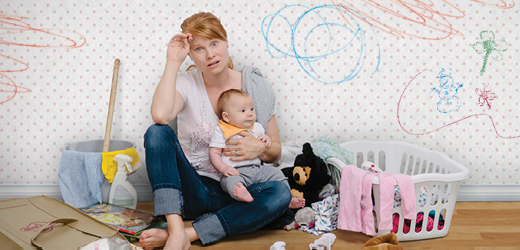
Image via PTE
A play by moms, for moms
Mom's the Word was conceived by a group of actresses and moms living in Victoria, BC in 1995, who all came together to share their stories of the trials and tribulations of motherhood. Together, they pooled their experiences and stories to form a cabaret-style, musical-ish play of sorts which touches on a variety of issues, including: postpartum depression, diapers (and diaper bags), panic, discipline, sex, changing bodies, and much more.
The play opened with a monologue from Jill (played by Yumi Ogawa) about childbirth which was... terrifying, to say the least. I've never had children, but I hope to someday, and seeing such a raw performance of the anxiety, stress, and sheer animalistic power of birthing was a bit unnerving. But, at the same time, it felt oddly inclusive; like this was a trial that every mother goes through, and an experience that is uniquely female.
One of the other mothers, Robin (played by Lisa C. Ravensbergen), gave a hilarious monologue in which she described how she and her equally foul-mouthed partner accidentally taught their child to swear at an early age.
"I tell people he's just saying 'truck' and can't pronounce it properly" she laughs, looking exasperated and embarrassed. This hit home: both John and I include "colourful words" in our everyday vocabulary, and have no shame about it, but the outside perception that we may teach our kids "bad words" too soon in their lives, and be judged for it, is something I've thought about. It felt like such a relief to hear someone addressing it!
Women supporting women
The thing that I loved the most about Mom's the Word, though, was the focus on empowerment through storytelling. Motherhood (from what I can tell) seems like it can be a tremendously isolating experience at times, and it was encouraging to see the moms in the story reaching out and supporting one another.
These struggles were covered really well in the monologues delivered by Jill's character. Over the course of the play she narrates 'letters' to her husband, trying to explain and make sense of the different experiences they're both having (staying at home with the kids vs. maintaining a demanding career) which were, at times, utterly heartbreaking.
"How can I explain what my day was like to you?" she asks "most of my day is spent in silence; how can I put the look our baby and I shared into words?" As John, who came with me, gripped my hand I realized that these were going to be very real issues that I would one day have to face and make sense of, myself.
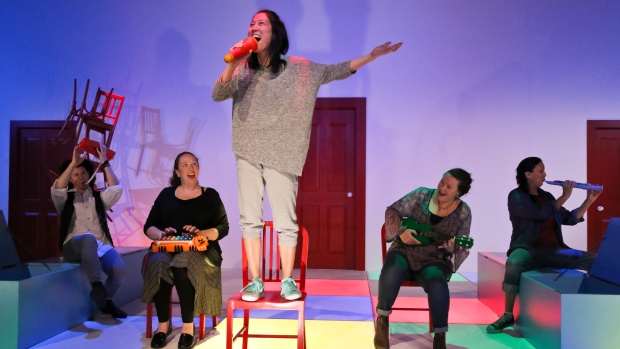 Image via CBC Manitoba
Image via CBC Manitoba
Laughter as medicine
The play wasn't all sad monologues and stressing out about dirty diapers; in fact, Mom's the Word presented the topic of motherhood in unabashed, shameless, hilarity.
In one scene, Alison (played by Trish Cooper) walks onstage jiggling a carrier as she tries to lull her infant (who was born prematurely) to sleep. Her baby falls asleep, but her muscle memory causes her to keep jiggling for several minutes as she addresses the audience. In another, Deborah (played by Jenny Wasko-Paterson) struggles through oral sex (taking bites of a banana onstage) as she says things like:
"I still want you to feel good"
"Oh no, I don't mind. I feel sexy when you feel sexy..." *eye roll*
This monologue is clearly demonstrating the struggles that many moms have with reconciling how tired, worn-out, and unsexy they feel, and the struggle to maintain a sexual relationship with their male counterparts who aren't feeling the same strain. Again, this is an area that worries me as a potential future-mom, and I appreciated that it was addressed and normalized within the context of the play.
The stand out scene for me, however, was one in which Deborah's character took her young son to the local pool. Her interactions with the toddler-age child, the fumbling, the mess, and the hilarious antics which ensued reminded me so much of being a young person, and spending my summers in the daycare my mom ran out of our house, which was always filled with toddlers exhibiting the exact behaviours described in the play.
As someone who doesn't yet have children and has a lot of mom-related baggage, Mom's the Word struck a series of chords that I didn't realize where inside of me. Yes, it was hard to watch some points, but the actors put words to many of the fears and anxieties that I have about motherhood, and presented difficult and stressful scenarios as ones which felt relatable, even to a non-mom like me.
Mom's the Word reassured me that, even if the world of parenting is going to be 'trucking' hard sometimes, at least I'll be able to laugh about it.
----
Mom's the Word is currently playing at PTE until November 27, 2016.
* Disclaimer: I get free tickets to see plays at the PTE in exchange for writing these reviews (it's wonderful)
In My Community: SPIN (or, I saw the strangest play last night)
- by Alyson Shane
Last night, despite frigid temperatures and hostile winds, John and I trekked out to the Prairie Theatre Exchange to check out the opening night of SPIN, an unusual spoken-word, musical, theatrical oddball of a play featuring a string section, two guitars, a projector, and a bicycle as an instrument.
It was by far the weirdest play I've ever seen, and I totally loved it.
For those of you who don't know me personally, I'm obsessed with riding my bike. I first got into cycling as an adult when the guy I was seeing at the time and I purchased matching his & hers vintage road bikes for $40. They were named Vikki & Vance, and I loved them.
A few years later an unfortunate (car) accident led to me purchasing my current velocipede, Barbara Streisand, whom I now ride all over town the moment the weather allows it. I love cycling; it's an amazingly freeing and fun activity, and there are literally few things that I love more than riding my bike around on a warm day in the sunshine.
So, naturally when I was offered free tickets to see SPIN, a play about cycling, I jumped at the opportunity.
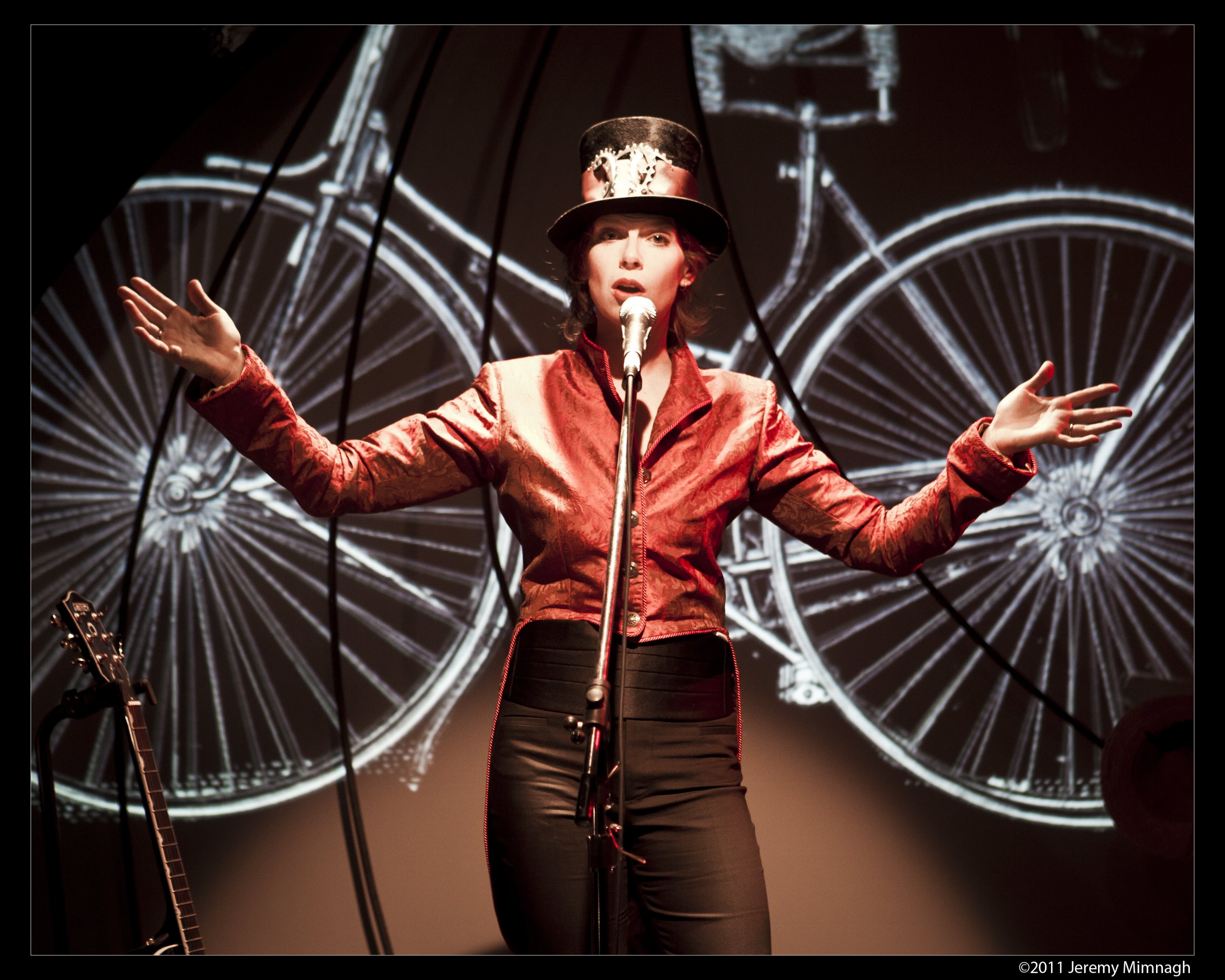
What's so good about a play about the bicycle?
What I didn't know about the bicycle before attending the play was this: the bicycle, in fact, was an important instrument for social change during the women's suffrage movement.
At the opening of the play, which is sort of a mash-up of ballads, catchy songs, and spoken-word pieces, Evalyn Parry emerges and does an impressive recital of Instructions on Learning to Ride a Bicycle, a pamphlet published by Miss Frances Willard, one of the most important suffragettes in history. After learning to ride a bicycle at 51 years old, she was so taken with this efficient mode of self-transportation that she wrote a pamphlet about it, declaring that "all women must all learn to ride, or fall into the sluiceways of oblivion and despair."
Wow. It definitely puts getting on my bike and rollin' around town feel a little less frivolous.
Not only are the stories that Parry weaves together hilarious, fascinating, and inspiring, but her vocals and guitar are backed up by... you guessed it, a bike. Brad Hart, Parry's accompanist who sports a fitting handlebar moustache, literally brings a vintage CCM bicycle to life by playing it like an instrument, suspended on a stand and connected to contact microphones.
The variety of sounds Hart can produce on a bicycle is, to say the least, a little mind-blowing. By using a combination of drum sticks, tuned bells, the spokes, frame, seat, and even the wheels themselves, he adds a unique and fitting element to Parry's songwriting.
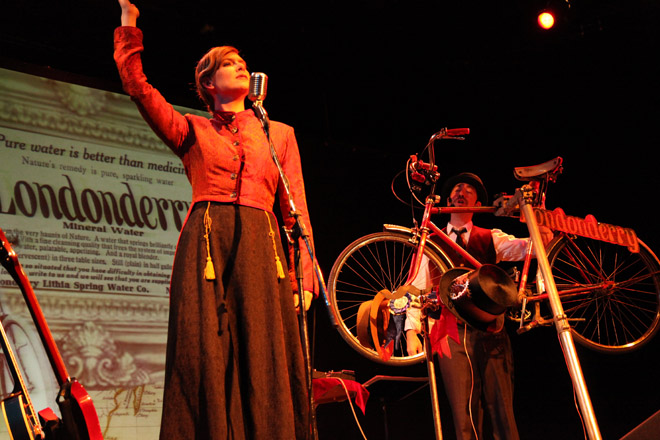
The bicycle as an instrument of social change
SPIN is inspired in part by the amazing true story of Annie Londonderry, the first woman to ride around the world on a bicycle in 1894. Not only was 23 year old Annie Londonderry (not her real last name, Londonderry Lithia was a mineral water manufacturer who sponsored her ride) unusual in that she accepted this unusual challenge, leaving her three kids and husband behind in Boston, but what I found striking (and ingenious) was that she scheduled press events everywhere she went. She sold advertising space all over her clothes and her bike - what a hustler!
This is just one of the examples that Evalyn Parry uses to illustrate how important the bicycle became to women in the late nineteenth century; for the first time ever women had a quick, easy, and most importantly an independent method of getting around.
The bicycle did more than just give ladies a way to get around, however: it also changed the way that we dressed. Using Annie Londonderry as an example of this sartorial shift, Parry paints a hilarious scene of Londonderry riding into a city and blowing people's minds with her masculine attire and her penchant for not giving a damn about it, thank you very much.
"Taking your life into your own hands"
One of the recurring themes throughout the play is the idea that the rider is connected to the bicycle, and that it allows them the freedom to go where they want, whenever they want, on their own terms. Parry weaves the idea of using your heart to move yourself around on your bike, and the idea that the bicycle and all it represents is connected to you as you ride around, beautifully.
"Taking your life into your own hands" also has a double meaning, referring to the suffragette movement and women's rights. As Parry points out throughout the play women's rights are the result of women "taking their lives into their own hands" and not allowing it to be dictated by men, and that the bicycle was one of the first ways in which women were able to start asserting their own independence in stodgy Victorian society.
Two-wheeled words/to wield words
To be honest, when I agreed to see the play I didn't quite know what I was signing up for, but I certainly didn't expect a cabaret-style, spoken-word/musical history lesson on women's rights featuring a bicycle as a backup instrument.
More importantly, however, SPIN made me appreciate what it means to be able to put on my pants and hop on my bike to go do whatever I please. As a woman who gets to enjoy a lifestyle which is a direct result of the hard work of so many women before me, it felt good to have the opportunity to develop a deeper appreciation for something that I already love so much (cycling).
In fact, I was so impressed by the play that it made me want to pull Barbara our, slap some giant winter tires on her, and ride that girl all around town. And in the middle of a frigid Winnipeg winter, that's saying something.
SPIN runs at the Prairie Theatre Exchange until January 31st. Grab your tickets here.
In My Community: Butcher
- by Alyson Shane
The most important stories are the ones which make us uncomfortable. The ones which force us to take a long, hard look at ourselves in the mirror and ask "what would I do? How would I react?" and then grapple with the response.
Butcher, a play by Canadian playwright Nicolas Billon, which is currently showing at the Prairie Theatre Exchange, is an example of modern storytelling which forces that kind of brutal, disturbing introspection.
Full disclosure: I was offered these tickets by the PTE in exchange for writing this article. I want to point that out because I want to be honest with you guys about when I get something for free, and also because I want to point out that what I'm about to say was in no way influenced by their offer. I was blown away by this play, and can't say enough good things about it.

A brief overview
Butcher is a play which starts with an old man who shows up at a police station wearing a military uniform, a Santa hat, and a meat hook draped around his neck. He doesn't speak English, but he's got a lawyer's business card stuck onto the meat hook with the words ARREST ME written on it.
Then, a series of scenes begin to unfold inside a single room between a detective, a translator, the lawyer, and the old man, which explore ideas around justice, vengeance, genocide, and forgiveness.
The play is full of twists and turns, and many times I found myself gripping my seat in anticipation. I don't think a play has ever moved me, or made my heart pound as hard in fear, as Butcher.
What makes it good?
I know I just said I wasn't going to spoil anything, but this one is necessary to actually review the play: the old man turns out to be "the Butcher, " a war criminal who ran a concentration camp during a civil war in the fictional country of Lavinia. The Butcher is wanted by two groups: Interpol, and a group of rebel survivors called The Fjurioji, or the Furies.
Butcher is comprised of a series of conversations about the brutalities of war, the kinds of inhumane things that humans can do to one another, and the cycle of violence that is continually perpetuated by hatred and revenge. It explores these ideas so deeply, and in such a visceral and compelling way that I found myself moved to tears or squirming in my seat on several occasions.
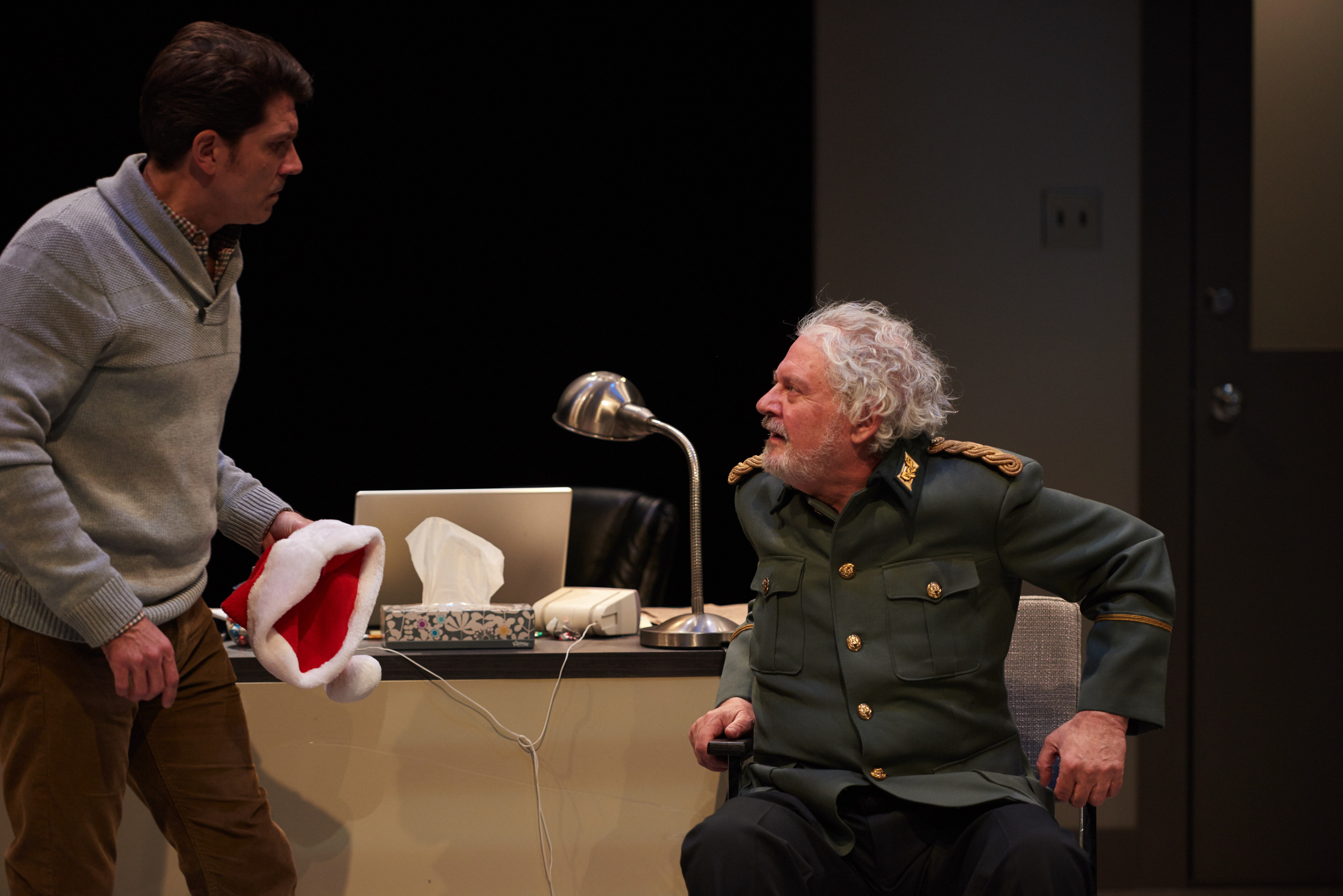
One example is when the old man is forced to confess his worst war crime. Most of what his character says is translated through the other characters, but in this case, as he describes his horrific, brutal actions, the audience can only rely on the reactions of other characters to interpret the severity and brutality of his actions.
This scene, where the audience was left to imagine the atrocities committed by a war criminal, was just one of many where I found myself cringing and feeling uncomfortable. It also served to illustrate how far-removed most Canadians are from the atrocities of war: even when someone is spelling them out for us, we still can't manage to comprehend what those experiences are like. It's like they're speaking another language.
Moving & thought-provoking
Lately it's hard not to feel like the whole world has become engulfed by fear and anger. From the recent Paris attacks, to the deplorable comments being shared across social media about Muslims and the Syrian refugees, it's terrifying to see how easily fear can enter our hearts, and stay there.
Butcher shows us how easily we can become consumed by our lust for revenge, and how even the most innocent among us can become twisted, mutated versions of ourselves when subjected to enough horrors and traumatic experiences. That when we treat others with hatred and fear, those people become permanently damaged or broken by it, and can only turn to more violence and hatred to try and fill the hole that our actions carved in them.
This idea, that the cycle of violence is a self-perpetuating process than can only be halted with deliberate kindness and forgiveness, was a powerful message which, I think, couldn't be more relevant to current global issues. Fear and division are powerful manipulative tools, and we have a responsibility to try and act better than the people who have mistreated us, or acted with hatred in their hearts.
With that in mind, I highly recommend that everyone check out Butcher while they can (it's running at the PTE until December 6, 2015). You won't be disappointed.
**I'd like to thank the Prairie Theatre Exchange once more for providing me with tickets to see this outstanding play. I was moved and humbled by Butcher, and can't recommend it enough.
Thermëa Winnipeg
- by Alyson Shane

Saturday night for Valentine's Day John and I went all-out and made sushi and drank sake and had wine and danced our hearts out while belting out old songs from our teenage years. It was spectacular and amazing and perfect, but we didn't get to bed until 6am.
Needless to say I was feeling a bit fragile the next morning but rolled out of bed and got myself to Thermëa Winnipeg, which as it turns out is the best way to treat a post-Valentine's Day hangover.

I've been jonesing to visit the spa since the general manager, Frederic, gave me a private tour of the site last winter. At the time with all the dirt and construction equipment it was a bit difficult to picture how everything was going to turn out (though the images from the other Nordik Spa locations helped) but being there in person absolutely blew me away.
You can't take photos in the actual spa area but the photo below (swiped from the Winnipeg Free Press) gives you a basic idea of what it looks like:
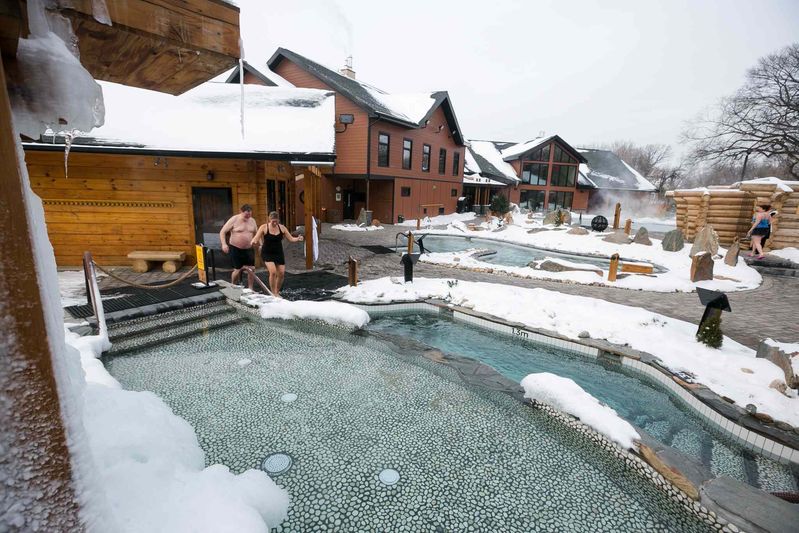
Yeah, it's all outside. In Winnipeg. In the winter.
Basically you go from warm, to cold, to warm, to cold, to warm, through a series of saunas to dipping pools and it is so much fun! It was pretty cold and windy but the heated pathways and enormous fluffy bathrobes kept us warm as we scampered from place to place.
The pool in the foreground in the photo is super cold, 10 degrees celsius to be exact, and you bet I took a dip in it like a champ after warming up in the Finlandia sauna (pictured on the left) - it was such a shock to my system and felt so good!
My favourite part of the experience was definitely sitting in the hot tub at the very end. It was pretty windy and frequently the steam would rise up and become so thick that I could barely see in front of my face, which was neat, and even though it was pretty busy the layout afforded us a lot of privacy.
The staff recommend doing the whole experience three times, which takes about three hours, though we only got through it twice because we're slow and spent a little too much time in the warmer parts of the sauna (whoops...)
Overall it was an amazing experience, and definitely something that I'd recommend doing to break up the monotony of our obnoxiously long winters - also, when hungover. I felt like a million bucks afterwards.
Want to check it out, too? Yeah you do. Leave a comment on this post and I'll pick a winner to receive two free passes.
Thanks again to Frederic and the kind staff at Thermëa for treating us so right!

